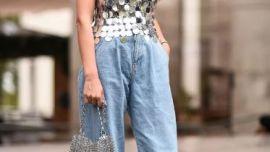A woman huddles against the gate of a church in downtown Buenos Aires, another in the entrance of a bank. Some choose the plaza outside a train station and others the ragged hallway of a hospital. Anything to endure the arrival of winter when living on the streets.
Tonight, some of the City’s homeless will receive hot soup and blankets made from recycled milk sachets – a palliative measure to face temperatures that drop to almost zero degrees at night in the capital and its outskirts during the cold southern winter.
Women from the Dando Una Mano (“Giving a hand”) NGO hand out handmade insulation produced by volunteers from La Sachetera, another non-governmental organisation that since 2012 has been making sleeping bags, tents and ponchos from recycled milk sachets, assisting those who have no choice but to sleep on the streets.
"They are waterproof products. What they do is insulate people from humidity. Buenos Aires is very humid and this allows them to wake up dry," says Gabriela 'Goga' Dodero, a 52-year-old mother of two and leader of La Sachetera.
To produce the blankets, the volunteers of La Sachetera meet once a month at the Club Güemes, a modest institution in the town of Villa Bosch, northwest of Buenos Aires. They need about 80 milk sachets to make a sleeping bag and around 200 for a two-sided 1.8-metre blanket.
"Between different groups we make about 600 products a year to distribute. We also coordinate with other campaigns, such as the Fundación Espartanos, [from] people who are in prison and produce 2,000 insulating blankets per year," explains Dodero.
She emphasises the ecological purpose of the enterprise, which seeks to reuse milk and yoghurt sachets – "recyclable polyethylene bags that are sealed by heat or by sewing."
"When we started 10 years ago, the sachets were not recycled, they went in the trash. We found a system to reuse them and now the sachets have a recyclable logo on them," adds Dodero.
For some Argentines, it brings back memories of when their grandmothers used to make shopping bags out of crocheted strips of milk sachets.
Rain and hypothermia
In San Fernando, a suburb some 25 kilometres north of the capital that borders wealthy neighbourhoods, around 20 people live on the streets. Every Sunday they receive a "very complete breakfast" every Sunday from the women of Dando Una Mano, an organisation its leader stresses is "non-political and religious."
Some already know of the milk sachet blankets from previous years but have lost them either through wear and tear, theft or because the police sometimes take away their few belongings, Débora Levy, 57, tells AFP.
The beneficiaries of a helping hand say they’re thankful for the assistance.
"I'm grateful to the kids who give us a hand, who give us a plate of food, a coat or an insulator. It's very important for those of us who have spent 24 hours a day on the streets for many years," says Cristian Pol Ramírez Soria, a 40-year-old Uruguayan.
Lying under blankets on the steps leading up to a theatre – a shelter he shares with two other men – Cristian says that the insulating blanket "is useful when it rains,” helping to protect the homeless “so we don't get soaked and die of hypothermia."
According to the volunteers, the number of people living on the streets has increased in recent years. City Hall data says that Buenos Aires – with around three million residents – officially had 2,573 homeless people in 2021, a figure questioned by social organisations who say they counted 7,251 people in 2019.
It is estimated that there are five times more homeless on the outskirts of the capital, where 11 million people live, according to a recent article by Juan Carr, the founder of the NGO Red Solidaria.
Extreme poverty rate reached 6.3 percent in Argentina in 2020, ranking in the middle of a list of a dozen countries from the region. Uruguay had the lowest rate (0.3 percent) and Colombia the highest (19.2 percent), according to estimates by the Economic Commission for Latin America and the Caribbean (ECLAC).
related news
by Liliana Samuel, AFP




















Comments